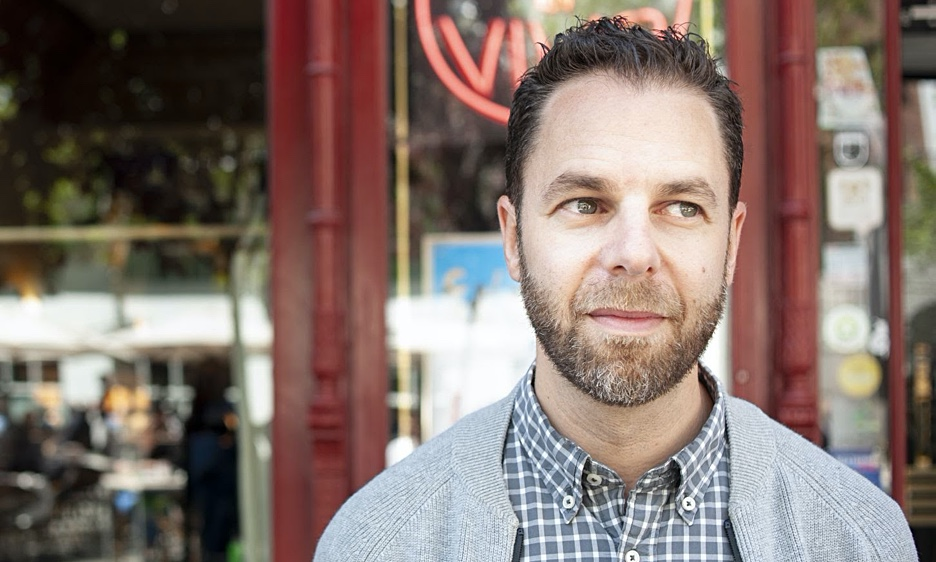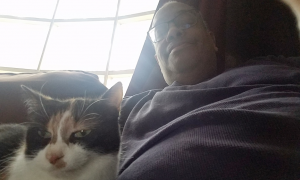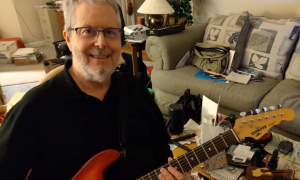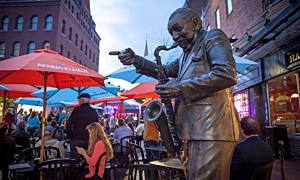Home » Jazz Articles » Meet the Staff » Meet Leo Sidran
Meet Leo Sidran

About Leo
Leo Sidran is a Grammy winning multi-instrumentalist musician, producer, arranger, composer, recording artist, and podcast host. After playing professionally as a teen-ager with the legendary Steve Miller Band he established himself as a versatile artist, as much at ease as a band-leader (with six albums in his discography) as he is producing other musicians domestically and abroad (in 2005 he co-produced the Academy Award Winning song, "Al Otro Lado Del Rio" from the film The Motorcycle Diaries for Jorge Drexler). He has composed over a dozen film scores for outlets such as ESPN 30 for 30, Discovery, IFC, Sundance, and PBS and TV commercials, and has played drums with jazz luminaries including Phil Woods, Howard Levy, David "Fathead" Newman, Clark Terry and Dave Grusin. As an engineer he has recorded projects ranging from jazz great Mark Murphy to British duo Massive Attack. And as if that was not enough he also co-founded and manages the independent label Nardis and hosts an influential podcast called The Third Story, featuring interviews with musicians, producers, songwriters.What is your first radio-related memory?
I have quite a few memories of radio as a young boy. I grew up in Madison, Wisconsin. There was a daily morning radio show on the local community station (WORT) hosted by a friend my parents, named Michael Feldman. Michael would eventually go on to host a nationally syndicated program called Whad'ya Know for many years, but at that time he was just the local morning radio guy hosting his show from a neighborhood diner near our house. My dad, Ben Sidran, and I would drop in on Michael sometimes in the morning on my way to school and talk to Michael on his show. It was completely improvised and always a huge joy.A few years later, I remember tagging along with my dad as he put together his NPR show, Sidran On Record (which later became the Talking Jazz series of books and audio interviews). Watching him conduct, transcribe and edit the interviews is an early memory and when I started producing The Third Story, I think I understood certain things about radio production that I had absorbed by osmosis as a young boy. In fact, when I was around 10 years old, I was given a reel of ¼" tape -maybe a copy of one of the interviews -along with access to a reel-to-reel tape machine at the local public radio affiliate in Madison (WHA) and learned how to "cut tape." Around that time I also hosted a local radio show for kids in Madison, called Kids On Air. It was a traditional variety show, with original songs, guest interviews, a weekly book review and music selection. I remember curating the music for the show. Among my selections were Janet Jackson's "Control," Huey Lewis' "Hip To Be Square" and Genesis' "Tonight Tonight."
How did your fascination with radio start?
Radio was really just part of the fabric of my life I guess. It wasn't so much of a fascination as it was a reality or an inevitability. But when podcasts came on the scene, that changed things for me in a major way.What radio shows were a fan of, and why?
I became a fan of podcasts around 10 years ago and that is what motivated me to start making long form audio content. First it was radio shows that had been released as podcasts, like Fresh Air with Terry Gross, This American Life, and Radiolab. Terry Gross is the godmother of the modern long form radio interview, and even now I find myself listening to her with a combination of frustration and awe. This American Life and Radiolab were inspirations for the way they truly embraced the format in order to tell stories, and used all of the tools and tricks of audio to convey a feeling and a sense of space and dimension, while also managing to feel intimate and personal. But it was Marc Maron's WTF Podcast that gave me the idea that I could really do it. I loved his in depth, earnest and candid conversations with the members of his tribe (comedians) and I thought that I could do the same thing with musicians.When did your jazz podcast career start?
In late 2014 I started inviting musicians to my studio in Brooklyn to talk. I made a few episodes before launching The Third Story, just to see if I could do it. Then I just went for it.Did you have a mentor or you are a self-made host?
I guess I'm self made, although I did have all that de facto mentorship from my father growing up.Do you recall the first album/song you ever presented on the radio?
I suppose it was one of those records I played on my kids radio show.What stations have you worked for?
I have been an independent podcaster since the beginning. However, I have created some custom episodes for WBGO in Newark.How do you approach each episode?
I approach each episode in 3 phases. The first thing is pre-production, which involves listening to an artist's work, watching videos, reading previous interviews, reading their books if that's relevant... but more than any one thing, the pre-production phase is spent thinking about the artist. I kind of create a set of observations, ideas, intuitions about the person and their work. I don't walk into the interview with a list of questions, but rather a general curiosity about the guest.The second phase is the interview itself, which usually lasts about 90 minutes. During the conversations, I just try to stay as open as possible. Over the years I have allowed myself to interject more, to be more active and assertive. But generally I try to just listen and let the conversation lead itself. I almost never have any agenda. Sometimes the artist or their publicist (or management) wants me to promote something. And that's fine. But I'm interested in creating documents that will last for a long time rather than doing specifically promotional content.
Finally there's the editing and post production. This is by far the most labor intensive and time consuming. I listen to the conversion for content, but also for ahs, ums, stutters, redundancies, and anything that I think interrupts the flow of the talk. I'm picky about that. Then I intercut music into the episodes, write and record an introduction, create the blog entry, curate a Spotify playlist and Youtube clips, write an email to my mailing list, another one to my Patreon patrons, and craft the social media posts. It's a lot.
Meanwhile, in the background, I'm booking the upcoming shows and preparing for them as well.
How long does it take you to produce a show?
I think the combination of all those tasks is generally around 15 hours.Are you a Vinyl, CDs, or Files host?
Because I'm not really a DJ, and the show is more about the interviews than it is about spinning music, I do everything digitally.What is it that usually impresses you about a musician?
Personality. Uniqueness. I tend to be drawn to people who defy category in some way. But I also love great stylists.How do you engage with your audience?
In any way possible. I write emails to them, I post on social media, and I try to respond to anyone who takes the trouble to reach out to me. There is really nothing better than getting a message from a listener who enjoys, or simply has a comment about one of the episodes.Do you have a sense of who's listening to your shows?
There are a few ways to measure the audience. One is in the raw download data. That tells me how many people are listening, and to be completely honest, it feels low to me sometimes. Lower than I would like. But considering this is a completely independent venture with no producer, network, team, or distributor, I am very proud of what I have been able to achieve on my own.There's a second indicator of who is listening, and that comes from the personal messages I receive. It's definitely a lot of musicians and music enthusiasts. I know that it is being used by some college students, referenced in dissertations and theses. And musicians reach out to me personally quite a bit asking to be interviewed for the podcast.
But for me the best indicator comes every now and then when someone somewhere recognizes my voice. It has happened a few times and it's an incredible thrill.
How do you feel about "airwave radio" vs. "internet radio"?
Every time I have a chance to do live airwave radio I absolutely love it because it's so spontaneous and alive. As much as I love making content, polishing it up, producing it and crafting it, there is no substitute for being live on the air. I would love to do that regularly someday.If you were programming your final radio show, which songs would you open and close with?
Again, because I am more focussed on interviews, I don't think of my program in these terms really.Do you listen to other jazz radio shows? If so, which ones do you enjoy most?
I still listen to a lot of podcasts: Marc Maron, Malcolm Gladwell, Rick Rubin, Alec Baldwin, Terry Gross, Radiolab, Switched on Pop, And The Writer Is, 99% Invisible... I see myself as much as being in the "culture space" as being a "music show" or a jazz broadcaster. I also check out Gilles Peterson, Gary Walker on WBGO, Mark Ruffin on Sirius XM... but the truth is that I don't listen to a lot of music on the radio.What is your favorite song to whistle or sing in the shower?
"Monk's Dream"If you could have dinner with anyone from jazz history, who would it be and why?
I think that's almost too hard to answer. Maybe someone like Pannonica de Koenigswarter ("Nica"). If it has to be just one person I would want to meet someone who had some perspective on the history they had seen, someone with a bit of an arm's length sensibility about the music and the musicians, and someone with a rich and compelling personal history.What underrated album do you wish everyone knew about?
I love Marc Miralta 's New York Flamenco Reunion featuring a group of innovative Spanish jazz musicians (Javier Colina, Guillermo McGill, Perico Sambeat) and the American pianist George Colligan. I love it for very personal reasons, but it's super hip and swinging in a unique way.How would you describe the state of jazz today?
Expansive, in flux, complicated. Like life itself.What are some of the essential requirements to keep jazz alive and growing?
That audiences keep listening and that artists make music that audiences want to listen to. That the music stays, as Jon Batiste told me, "in life."Listen to the Show
Third Story ArchivePhoto: Courtesy of Leo Sidran
< Previous
Cry Babies
Next >
Meet Russell Perry
Comments
Tags
Meet the Staff
Leo Sidran
ben sidran
Gilles Peterson
Pannonica de Koenigswarter
Marc Miralta
Javier Colina
Guillermo McGill
Perico Sambeat
George Colligan
For the Love of Jazz
 All About Jazz has been a pillar of jazz since 1995, championing it as an art form and, more importantly, supporting the musicians who create it. Our enduring commitment has made "AAJ" one of the most culturally important websites of its kind, read by hundreds of thousands of fans, musicians and industry figures every month.
All About Jazz has been a pillar of jazz since 1995, championing it as an art form and, more importantly, supporting the musicians who create it. Our enduring commitment has made "AAJ" one of the most culturally important websites of its kind, read by hundreds of thousands of fans, musicians and industry figures every month.























